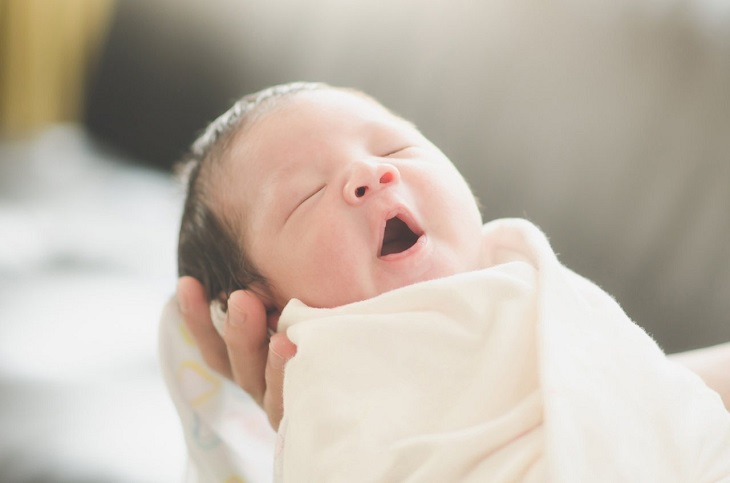Taking care of a newborn is a strange and often difficult thing for most young mothers, especially those who are giving birth for the first time. To best prepare for the baby’s health, parents need to pay attention to the following when taking care of a newborn.
Things to remember when caring for a newborn
1. Put your baby to sleep properly
Newborns often wake up at night to feed every 2-3 hours, here are some tips for putting your baby to sleep:
- Baby should sleep on a firm, flat surface (usually a bed/crib). Hammocks, rocking cradles, strollers, slings, and swings are not recommended for babies under 4 months of age.
- Parents should sleep in the same room but not in the same bed with their baby, preferably for the first six months.
- Keep the room warm, especially in cold climates, and make sure to add moisture to your baby if their skin is dry or the weather is dry.
- Parents should dress their baby in a layer of clothing or wrap their baby in a blanket of appropriate thickness to the weather. When wrapping a newborn in a blanket, always place the baby on his back when being wrapped. When the baby can roll over (usually happens when the baby is 3 to 4 months old, but can happen earlier), swaddling is no longer appropriate, because it can increase the risk of suffocation if the baby moves to the prone position.
The baby is at high risk of sudden increases and decreases in body temperature because the baby’s nervous system is not yet fully developed to regulate its own body temperature. The baby’s body temperature should be kept at 36.5 – 37.5 degrees Celsius by:
- The room should be warm enough, the room temperature should be adjusted to 27 – 28 degrees Celsius during the day; 28 – 29 degrees Celsius at night. Dress the baby, wear gloves, socks, a hat and cover with a thin blanket when lying in the air conditioner.
- In addition to the baby’s sleep at night, the baby should not be left in the air conditioner for more than 4 consecutive hours during the day. After about 4 hours, the baby should be taken out to normal temperature for 10 – 15 minutes.
- Check your child’s body temperature with a thermometer. If your child is sweating, dry him or her, especially the back, otherwise he or she may get a respiratory infection. Avoid sudden changes in temperature. Open the door 10 minutes in advance to let your child get used to the outside air.

Taking care of a newborn baby is often difficult for most young mothers.
2. Eye care
Newborns often have watery eyes and discharge in the first days after birth. At this time, the baby may have conjunctivitis, take the baby to the doctor for appropriate treatment. At the same time, it is necessary to build a suitable diet for the baby with lots of green vegetables, fish, meat, eggs, soy milk, sesame oil, fruits that are good for the eyes.
Let the baby eat and sleep enough, at the right time. Avoid external factors such as smoke, dust, sunlight by wearing dustproof glasses, sunscreen, to avoid damage to the baby’s eyes.
3. Umbilical cord care
The baby’s umbilical cord will dry and fall off on its own within 5 – 21 days after birth. If the umbilical cord is not carefully cared for, it is susceptible to infection.
If you see the following symptoms in your child, take him/her to the hospital: The child has a fever, the umbilical cord has a foul odor or the umbilical cord is oozing pus, the skin around the umbilical cord is red and soft, the child cries when you gently touch the umbilical cord, the umbilical cord is swollen and bleeding.
4. Monitor your child’s health at home
Parents need to pay attention to having their child re-examined and vaccinated according to the appointment schedule or take their child to the doctor immediately if the child has the following dangerous signs: Convulsions; Rapid breathing (breathing rate > 60 times/minute), chest retraction; No flexible movements; Fever/high body temperature (> 38°C) or low body temperature (< 35.5°C); Jaundice in the first 24 hours after birth, or jaundice on the palms and soles of the feet. And finally, the most important thing is to always remember to wash your hands when taking care of your child.
National vaccination schedule for newborns
- Newborns: Tuberculosis, hepatitis B. Vaccinate in the first 24 hours after birth.
- 2-month-old children: Diphtheria, whooping cough, tetanus, Hepatitis B, Hib, dose 1, Polio 1.
- 3-month-old children: Diphtheria, whooping cough, tetanus, Hepatitis B, Hib, dose 2, Polio 2.
- 4-month-old children: Diphtheria, whooping cough, tetanus, Hepatitis B, Hib, dose 3, Polio 3.
- 5-month-old children: Polio injection (IPV).
- 9-month-old children: Measles dose 1.
- 18-month-old children: Diphtheria, whooping cough, tetanus dose 4.
- 1-5-year-old children: Japanese encephalitis dose 1.
- Japanese encephalitis dose 2 (1-2 weeks after dose 1).
- Japanese encephalitis dose 3 (1 year after dose 2).





